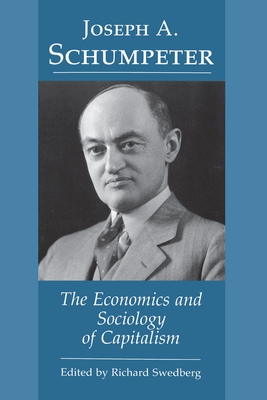

 Princeton University Press
Princeton University Press
Joseph A. Schumpeter: The Economics and Sociology of Capitalism


Key Metrics
- Richard Swedberg
- Princeton University Press
- Paperback
- 9780691003832
- 9.23 X 6.08 X 1.02 inches
- 1.53 pounds
- Business & Economics > Free Enterprise & Capitalism
- English
 Secure Transaction
Secure TransactionBook Description
The renowned economist Joseph A. Schumpeter (1883-1950) made seminal contributions not only to economic theory but also to sociology and economic history. His work is now attracting wide attention among sociologists, as well as experiencing a remarkable revival among economists. This anthology, which serves as an excellent introduction to Schumpeter, emphasizes his broad socio-economic vision and his attempt to analyze economic reality from several different perspectives. An ambitious introductory essay by Richard Swedberg uses many new sources to enhance our understanding of Schumpeter's life and work and to help analyze his fascinating character. This essay stresses Schumpeter's ability to draw on several social sciences in his study of capitalism.
Some of the articles in the anthology are published for the first time. The most important of these are Schumpeter's Lowell Lectures from 1941, An Economic Interpretation of Our Time. Also included is the transcript of his lecture Can Capitalism Survive? (1936) and the high-spirited debate that followed. The anthology contains many of Schumpeter's classical sociological articles, such as his essays on the tax state, imperialism, and social classes. And, finally, there are lesser known articles on the future of private enterprise, on the concept of rationality in the social sciences, and on the work of Max Weber, with whom Schumpeter collaborated on several occasions.
Author Bio
My two main areas of research are economic sociology and social theory. Economic sociology has been a vital interest of mine since the early 1980s; and today I mainly work on current topics. From early on I have also been fascinated by social theory, especially theorizing — what theorizing is and how it can be taught to students through practical exercises. My main work on this topic is The Art of Social Theory (2014). I have also worked on social mechanisms (see Social Mechanisms [1998]; ed. with Peter Hedström).
In the early 1980s I became interested in economic sociology, and I have had the pleasure to help this field grow into one of the major subfields in sociology. My contribution to this has consisted of general works as well as specific studies. For the former, see especially (ed. with Neil Smelser) Handbook of Economic Sociology (1994, 2005) and (ed. with Mark Granovetter) The Sociology of Economic Life (1992, 2001, 2011). For the latter, see e.g. (ed. with Victor Nee) The Economic Sociology of Capitalism (2005), (ed. with Trevor Pinch) Living in a Material World (2008) and (ed. with Hirokazu Miyazaki) The Economy of Hope (2017).
Along the road I have also made a number of studies of the major theoreticians in economic sociology, such as Joseph Schumpeter, Max Weber and Alexis de Tocqueville. The study of Schumpeter is formally a biography, but in reality centered around the relationship of economic theory to economic sociology. The study of Weber attempts to lay a theoretical foundation for economic sociology by following Weber’s leads in Ch.2 of Economy and Society. In my work on Tocqueville my interest in economic sociology comes together with that of theorizing. I emphasize the sociological aspects of Tocqueville’s analysis of the economy, but also how he experimented with different types of data and theories, to make sense of things. See Schumpeter – A Biography (1991), Max Weber and the Idea of Economic Sociology (1994) and Tocqueville's Political Economy (2009).
Besides social theory and economic sociology, I have also written on various other topics — such as the role of civic courage; (with Wendelin Reich) on George Simmel’s metaphors; on Rodin’s statue “The Burghers of Calais”; and (with Trevor Pinch) on Wittgenstein’s visit to Ithaca in 1949. These articles can be found on my webpage.
Today I mainly try to write sociological essays, with an emphasis on new ideas. The topics vary, from traditional ones in social theory to more unorthodox ones, with the same for economic topics.
Education
MM.L. (“Juris kandidat”), Faculty of Law, Stockholm University June 1970;
Ph D, Department of Sociology, Boston College May 1978.
Source: Cornell University
Videos








Community reviews
Write a ReviewNo Community reviews